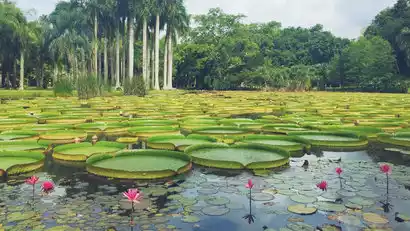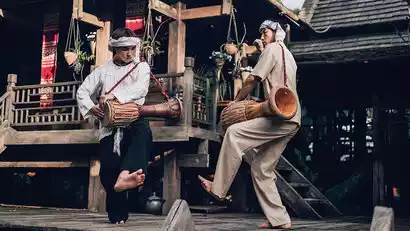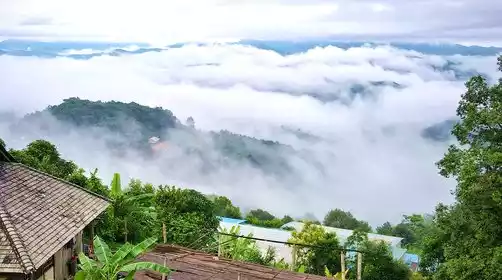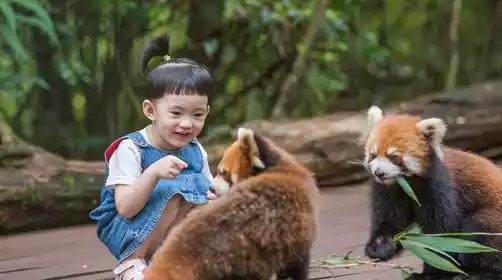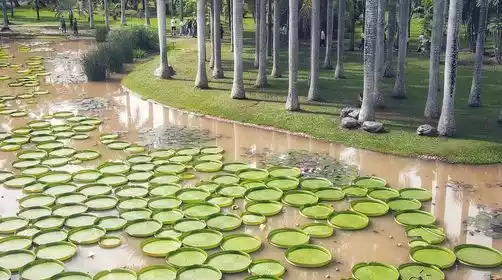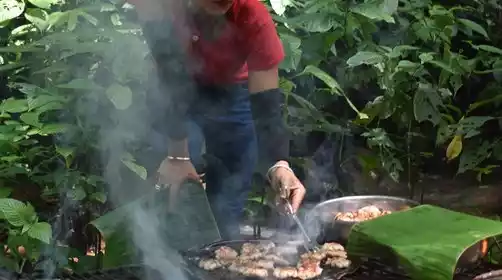Day 1 Various locations → → → Jinghong ★ Gathering day
All day
Today is a full-day gathering day, and tourists from all over the country will arrive at the gathering hotel to check in on their own.
Jinghong, the capital of Xishuangbanna Dai Autonomous Prefecture, is a small frontier town imbued with Southeast Asian charm and a filming location for numerous Southeast Asian-themed television series. Nestled on the banks of the Lancang River, the town is immersed in lush greenery. If you're traveling from a bustling city, be prepared for the uniquely relaxed, tropical atmosphere. During the day, the streets are bustling with people, but the crowds begin to surge towards dusk. Take advantage of the quiet time by contemplating at Zongfo Temple or exploring the Dai King's Imperial Garden in the city center, Manting Park. In the evening, the Binjiang Night Market comes alive with lights, and you can linger in a riverside bar. Don't forget to enjoy a cup of local arabica coffee after your meal.
How to get to Banna
The meeting hotel is in Gaozhuang, about 9km away from the airport (Gasa Airport), and the drive takes about 25 minutes.
1. Direct flight to Banna: For tourists with limited time, you can choose direct flight;
2. Transfer in Kunming: There are more than 20 flights between Kunming and Banna every day. You can choose to transfer in Kunming, which saves both time and cost.
3. Kunming-Banna High-speed Train: High-speed trains are now available from Kunming to Banna, taking about 4 hours. There are many trains running daily. Please check the specific train schedule and prices in real time.
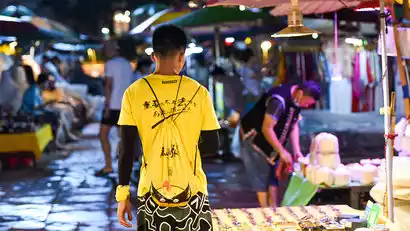
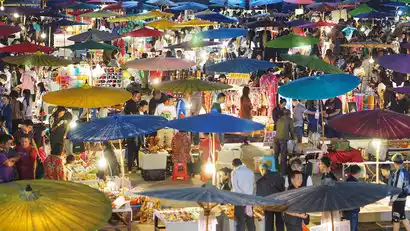
Day 2 Jinghong → Pu'er
·morning
Enjoy a cup of coffee at a coffee farm and learn about the process from seed to cup
After breakfast, we'll depart for the coffee farms surrounding Pu'er. If Pu'er tea is the A-side of the region south of the Tropic of Cancer, coffee is its B-side. The region's unique geographical and climatic conditions allow coffee to fully absorb the natural elements, while meticulous craftsmanship imbues the beans with diverse flavors. Pu'er's coffee growers have dedicated themselves to the study and refinement of green bean processing and roasting techniques, and boutique coffee farms are slowly blossoming in this fertile land. Step inside a coffee plantation to observe the entire coffee production process, enjoy unlimited coffees of varying flavors, and listen to the stories of the coffee growers, leaving you with a lasting impression.
·afternoon
Wander around the Red Panda Manor and make friends with the little animals
Afterward, we'll visit Pu'er's Sun River National Forest Park, a rare oasis on the Tropic of Cancer, home to over 800 species of wildlife. Located in the tropical-subtropical transition zone, it boasts 3.12 million mu (approximately 1.6 acres) of pristine forest and a 97% forest coverage rate. With neither severe winter cold nor scorching summer heat, it's a haven for both flora and fauna.
Visit the Rhino Terrace Scenic Area, where white rhinos have been relocated from South Africa. After their acclimatization period at Yunnan Wildlife Park, they've moved to Pu'er Forest Park, where they're helping to rebuild the rhino population. Besides rhinos, there are many other adorable animals to explore, including the adorable raccoon, owls, slow loris, and other wildlife you won't find anywhere else.
Stay in Pu'er city and experience the slow pace of Pu'er
The pace of life in Pu'er is slow, with groups of locals strolling along the streets. Cafes and teahouses are lined up on the streets, and delicious snacks are everywhere. After arriving in Pu'er and checking in, you can freely go to Daijia Lane, the administrative compound, and other places to drink coffee, eat snacks, and spend this leisurely afternoon.
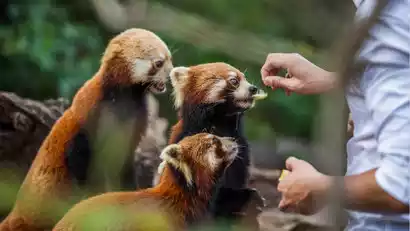
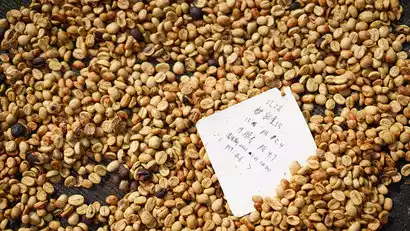
Day 3 Pu'er → Laodabao → Jingmai Mountain
·morning
Go deep into the village and meet the Lahu people who are good at singing and dancing
In the morning, we'll travel directly from Pu'er to Lancang County to begin our journey to Jingmai Mountain. We'll first visit the renowned Lahu village of Laodabao. The name "Lahu" means "tiger hunters," and the Lahu people are proud of their belief that "as soon as they can talk, they can sing; as soon as they can walk, they can dance." They even represented Yunnan on the "Spring Festival Gala." We'll visit a Lahu family and learn about the past and present of the Lahu people in their stilt houses. At lunch, we'll enjoy a Lahu song and dance performance, listen to a Lahu toast song, and learn a Lahu dance, experiencing the authentic singing, dancing, and warm hospitality of the people of southwestern Yunnan.
·afternoon
First sight of Jingmai Mountain, a World Heritage Site, and a leisurely hike through the ancient tea forest to learn about the history of tea trees.
Since the 10th century, the Bulang people have discovered wild tea trees and cultivated them artificially, developing a unique "under-forest tea" cultivation method. This practice has persisted for over a thousand years, leaving behind five precious ancient tea forests. Explore the Dapingzhang Millennium Ancient Tea Garden in Jingmai Mountain and wander through the gardens to discover these unassuming yet time-honored ancient tea trees.
Visit Nuogan Ancient Village and experience the leisurely life of the Dai people in the mountains
Finally, we arrived at Nuogan Ancient Village, the primary filming location for "Home at One Point." The Dai people here may differ from the typical Dai people. Having long inhabited the Jingmai Mountains, they possess both the gentleness of traditional Dai and the boldness of the mountains. What truly captivated us was the village's simplicity and tranquility. The original stilt houses are perfectly preserved, and the villagers live comfortably within the village. This peaceful atmosphere has earned it the nickname "a true paradise."
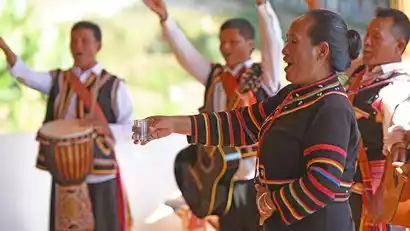
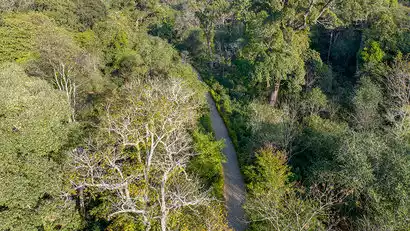
Day 4 Jingmai Mountain → Menghai
·morning
Waiting for the sunrise over the sea of clouds at Jingmai Mountain, it feels like entering a fairyland at Jingmai Mountain
Get up early to watch the sunrise. The temperature drops sharply at night, causing condensation and a chance to see a sea of clouds (higher in winter due to the large temperature difference between morning and evening, lower in summer). Waves of cloud "lap" against the foot of the mountain before gradually receding, shrouding the entire tea mountain in mist. It's truly a dreamlike experience. Enjoy the beauty of the Pu'er tea mountains as the sun rises. Alternatively, wake up early to the sound of insects chirping and enjoy a lazy sleep in the tranquil Jingmai Mountains.
Jingmai Mountain Ancient Village Country Walk, telling the history and folk customs of the Bulang people
After sunrise, we'll stroll through Mangjing Village, one of the nine ancient villages within the Jingmai Mountain Ancient Tea Forest Cultural Landscape in Pu'er. Home to the well-preserved Bee God Tree, this village demonstrates the harmonious coexistence of generations of local people with nature. We'll then visit Wengji Bulang Ancient Village, where the village's pristine preservation and the simple, unpretentious people are truly captivating. The village's 3,000-year-old cypress trees, ancient tea trees, and traditional tea culture imbue this ancient village with a profound yet profound charm. We'll also take a special Jingmai Mountain Ancient Village Country Walk, where we'll learn about the Bulang people's history, explore the village's quaint architecture and roads, and further understand the culture of Jingmai Mountain.
Fire pit roasted tea & Brown singing, exploring the core of tea-themed heritage in traditional ways
The Bulang people are recognized by academics as the forefathers of tea cultivation in Yunnan. Jingmai Mountain boasts numerous thousand-year-old tea trees, where it's common for both men and women to drink roasted tea and smoke dry tobacco. In Mangjing Village, join a local family around a traditional fire pit and enjoy a pot of traditional roasted tea. Witness the elderly, who drink every three days, never forgetting the leisurely life of tea picking, and experience the charm of this millennial tea-growing people. As the sanxian (three-stringed instrument) plays, the melodious, ancient tune unfolds, transporting you back a thousand years. Learn a few words of Bulang dialect, and the Bulang people's simplicity and warmth will be captured in their tea and songs.
·afternoon
Jingmai Mountain Heritage Exhibition Center, witness the charm of world cultural heritage
Leaving Jingmai Mountain, we'll head to the Jingmai Mountain Heritage Exhibition Center, where a sand table diagram, production tools, and ethnic costumes are displayed. A stroll through the center will provide a comprehensive overview of the Jingmai Tea Mountain, encompassing its history, culture, and the key elements that contributed to its successful World Heritage status. We'll then continue on to Menghai, stopping at the Jingzhen Octagonal Pavilion along the way.
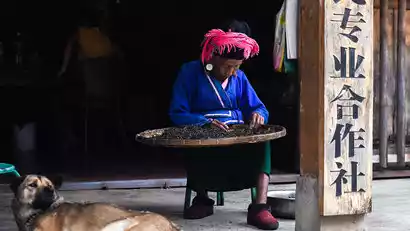
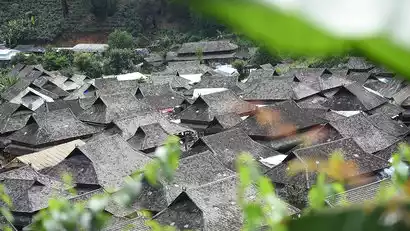
Day 5 Menghai → Tropical Rainforest → Tropical Botanical Garden of the Chinese Academy of Sciences
·morning
Take a light hike in the rainforest and learn about the exotic flowers and plants in the rainforest
High heat and humidity are the primary climate characteristics of tropical rainforests, driving rapid plant growth. Even a jungle path, traversed daily, can feel mysterious thanks to the lush vegetation. Fresh plants lining the path might be less than a month old. The towering trees of the rainforest make us realize how insignificant we are in the face of nature. Following a local guide, we journeyed into the rainforest trails to experience the mystery of the pristine forest and discover its exotic flora.
·afternoon
Wild Kitchen, experience traditional green leaf meals
In tropical regions, there's a unique meal called the Green Leaf Feast. Following the simple and environmentally friendly tradition of the Hani ancestors who once dined in the jungle, the feast involves wrapping food in banana leaves and other green leaves, creating an ancient Hani jungle feast in the primeval forest.
Jungle tree rappel, climb a tree and overlook the ground to find the fun of childhood
The trees in the jungle are always very tall. To change your perspective, choose a huge banyan tree, climb up to overlook the ground with the protection of professional equipment, and then descend from the sky. In the primeval forest, release your nature and take an unforgettable jungle rappelling trip.
·night
A nighttime stroll through the botanical gardens, where you can recapture your childhood joy amidst the chirping of insects and
The botanical garden's diverse vegetation attracts a diverse group of small animals, including croaking frogs, tactile stick insects, and, in May and June, a dazzling array of fireflies, forming a small ecosystem. Embark on a journey through tropical nature, listen to frogs, spot insects, listen to birds, and observe plants, experiencing the unique vitality of nature in the darkness.
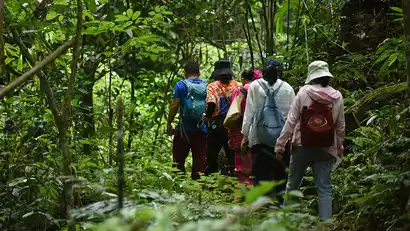
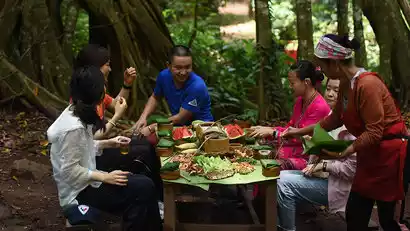
Day 6: Tropical Botanical Garden of Chinese Academy of Sciences → Manyuan Village → Jinghong ★ Dismissal Day
·morning
Wander around the core area of the Tropical Botanical Garden and listen to the exotic plants grow
Head to the 5A-rated Tropical Botanical Garden, West Zone, Chinese Academy of Sciences, for a true encounter with tropical plants. Experience towering "giant buttress roots," the brutal and thrilling "strangler plants," the majestic "one-tree forest," the colorful "hanging gardens," the bizarre "old stem blossoms," and the swirling "giant vines"—everything will amaze you. Explore the vibrant colors of "exotic flowers," the sweet and sour "miracle fruit," the swaying "dancing grass," the punctual "clock flowers," and the chilling "bloodthirsty thorns."
·afternoon
Experience Dai culture and learn the elephant-foot drum dance in Manyuan Village
Leaving the Tropical Botanical Garden, we journeyed to Manyuan Village, the filming location for the TV series "A Longing for Life," where we invited locals to teach us the Elephant Foot Drum Dance. Elephant Foot Drum Dance, a symbol of Dai culture, combines the characteristics of martial arts and dance, boasting a blend of strength and gentleness, a unique ethnic charm. It has been designated a National Intangible Cultural Heritage. Grab an elephant foot drum and learn the form, sound, momentum, martial arts, and dance elements of the dance.
Then take a stroll around the entire pristine Dai village, leaving free time to experience Dai handicrafts on your own. You can choose to experience making Dai pottery, weaving bamboo baskets, making flower paper, palm leaf scriptures, or mushroom houses (the experience project fee is not included, the reference fee is 10~20 yuan/each, the evaluation is simple and affordable, it is worth choosing a few experiences that you like).
Send you to the airport/station and say goodbye at the end of your trip
We will depart at the appropriate time and will be picked up at Xishuangbanna Station around 17:00. We will then drop you off at Xishuangbanna Gasa Airport around 17:30. For your return trip, please book a train departing after 18:00 or a flight departing after 19:00. Please relax this policy during holidays. If you need to continue to Jinghong City, the group will disperse near Manting Park.
